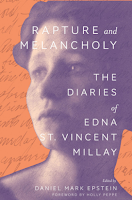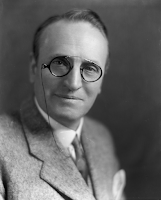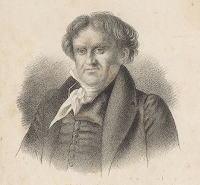The diaries of Edna St. Vincent Millay, sometimes called the ‘bad girl of American letters’, have been published some 70 years after her death. Many of the entries are rather banal, domestic, but occasionally there are flashes of the ‘bad girl’, such as in this entry: ‘I wrote a letter to the League of American Penwomen, telling them where to get off - for inviting Elinor [Wylie] to be Guest of Honor & then writing her canceling the invitation on the grounds that she is not a respectable person. The sanctified flatfooted gadgets. I wish I had been a Fifth Avenue street sparrow yesterday - or in other words:
I wish to God I might have shat
On Mrs. Grundy’s Easter hat.’
Further poetry books and a couple of plays followed before she travelled to Europe for a two-year sojourn, acting as correspondent for Vanity Fair. In 1923, she won a Pulitzer Prize for Ballad of the Harp-Weaver. She married Eugen Jan Boissevain, a Dutch businessman and self-proclaimed feminist, who supported her career and took care of domestic responsibilities. In time, they moved to live in a large farmhouse near Austerlitz, New York state. Throughout their 26 year marriage they both had other partners. In 1925, the Metropolitan Opera Company commissioned her to write an opera with Deems Taylor. The King’s Henchman, first produced in 1927, became the most popular American opera up to its time.
Encyclopaedia Britannica has this assessment: ‘Millay’s youthful appearance, the independent, almost petulant tone of her poetry, and her political and social ideals made her a symbol of the youth of her time. [. . .] The bravado and stylish cynicism of much of [her] early work gave way in later years to more personal and mature writing, and she produced, particularly in her sonnets and other short poems, a considerable body of intensely lyrical verse.’ In mid-1936, she suffered a severe accident which left her in constant pain, and needing operations and morphine. Though previously a pacifist, WW2 changed her views, and she became an advocate for the US to enter the war, damaging her popularity in some quarters..
In 1943, Millay was the sixth person and the second woman to be awarded the Frost Medal for her lifetime contribution to American poetry. Nevertheless, her declining reputation, constant medical bills (including treatment for morphine addiction) and demands from an ill sister meant she was in often in debt during her final years. Boissevain died in 1949, and she died in 1950. Further information is available from Wikipedia, Encyclopaedia Britannica, The New Yorker or The Poetry Foundation.
Millay left behind a series of diaries from different periods in her life, but 90% of the entries are for her teen/youthful years 1907-1914 and for 1927-1935. Some 70 years after her death they have finally been published, edited by Daniel Mark Epstein, as Rapture and Melancholy: The diaries of Edna St. Vincent Millay (Yale University Press, 2022). The contents can be previewed at Googlebooks.
‘To what,’ Epstein asks in his introduction, ‘does Edna St. Vincent Millay owe the honor of having her diaries published and read in 2022, more than seventy years after her death? Her status as a poet and playwright of the first magnitude, secure until the 1940s, is now a subject of debate. Her poems remain in print and her play Aria da Capo is occasionally revived; but as of this writing her work is rarely included in textbooks or college syllabi. The reasons for this are largely political, or in any case extra-literary. The poet had the fortune and misfortune to become a legend in her own time, what we now quaintly call “a cultural icon.” Her binge drinking and promiscuity were notorious even in the 1920s when such behavior was commonplace. She became the bad girl of American letters who published her modern escapades in verses that demonstrated mastery of the classic forms and meters. No one had seen anything like it. Ezra Pound and T. S. Eliot, who had enough Latin between them to recognize her achievement, ostentatiously ignored the upstart whose ballads and sonnets made her rich. She needed no one’s help, and what she was writing did not fit the modernists profile of “free verse.” Her success was a reproach to modernism. Meanwhile she behaved as badly as Byron and Baudelaire, Sappho in a cloche hat, chain-smoking, sipping gin, bed-hopping - a person who would not serve as a moral role model in those times. The poetry was transgressive and subversive. Compared with the unimpeachable verse of Elizabeth Bishop, Millay’s poetry is still shocking. [. . .]
She is our greatest love poet with the possible exception of Walt Whitman. She has written many sonnets that compare favorably with the best of Shakespeare, Sir Philip Sidney, and John Donne. Without an axe to grind there is no knowledgeable reader who would dispute the evidence which print has made imperishable. The great poems won’t go away no matter how many professors bar the classroom door against them. As long as there are lovers, they will be reading Millay.
And so, like George Washington, Edna St. Vincent Millay is of interest to us because she was important - a groundbreaking writer. No less an authority than the English author Thomas Hardy proclaimed that America had two great attractions: the skyscraper, and the poetry of Edna St. Vincent Millay. Her diary provides a window not only upon a unique personality and intelligence, but also the creative process that produced sublime works of art. Last but not least, it is of considerable value as “journalism,” the impressions of a woman of a certain class growing up in a New England fishing village, traveling to New York for education and a literary career, and later to Europe, before settling down on a blueberry farm in the Taconic Mountains in 1925. Virtually overnight the small-town girl became dangerously famous; and the diarist’s record of that adventure is one of the most dramatic chapters of her story.’
Here are several of the published diary entries.
4 November 1912
‘Two letters and a card from my Editor. Miss Rittenhouse, secretary of the Poetry Society of America, says, “Renascence is far the best thing in the book. If it doesn’t get the prize I pity your judges.” But it didn’t get the prize! Everything but money!’
6 January 1913
‘Someone (I think it may be Mr. Kennerly) sent me a copy of the January Forum. When I first caught sight of it I thought that it might be a sample copy, and then wondered if there could be anything about my poem in it. So I looked down the index - and there was a review of The Lyric Year by one Charles Vale. So I hunted up the page (mit hands vot zhook) and happened to strike the end of the article first so that I caught a fleeting glimpse of a whole page of my poem. After which, very calmly (!), I proceeded to hunt up my beginning and find out what was said about me. Almost all of Renascence was quoted and the comments were quite satisfactory. I wonder if any other of the January magazines will have mention of the book. I must look them up.’
28 February 1913
‘Today has been wonderful. I have done so many things. Wasn’t late to breakfast. Did a big washing in the laundriette. Translated about ten pages of French on the roof (glorious!), dressed, and wasn’t late to luncheon. Started for Barnard about quarter to two, and wasn’t late to French (translated the rest of my lesson on the subway), went over to Morningside Drive and had tea and a delightful talk with Miss Rittenhouse, her mother, and Mrs. Kendall (?). Got home at ten minutes past six, dressed, and wasn’t late to dinner. Had another birthday party (all the Jan. & Feb. birthday girls) and a lovely carnation. Mrs. Trowbridge asked me to read some of my poems aloud after dinner, and I did. Later translated 2 1/2 pages of Horace.’
24 April 1933
‘Sweethearts calf, a heifer, born either today or yesterday.
Thought we’d all have a picnic luncheon, so took everything down into blueberry pasture near my old shack where I wrote The Kings Henchman. Built a fire for coffee in a little stone fireplace where we’d often done so before, were very careful everybody right on hand in case a spark should fly into the grass, sudden puff of wind blew fire out into the dead grass, all seized our coats & began beating it out, but in less than a minute it was roaring up the hill towards the pasture barn & almost in the direction of the house. Ran to get help. Austerlitz & Spencertown fire departments called out by ranger who saw fire from tower, came very quickly, also many neighbours. Fought fire all afternoon, came within a few hundred feet of kitchen garden. I was sure that the house & everything in it was bound to go. Under control before dark, however. Lost only my shack, which burned flat, and I’m afraid, some beautiful white birches, lovely thorn-bushes, too. Also my little green leather cigarette case, Arthur Ficke gave me, which was in my coat pocket. Tweed jacket of my suit looks pretty exhausted, too. But I am so grateful that the buildings didn’t catch fire that I don’t mind anything else very much. There were no papers in my shack, either, which was lucky. Came home nearly dead. Ugin gave all the men white wine.
Deems, Mary, Ugin & I had a bottle of champagne.’
18 April 1927
‘The loveliest day that ever dawned. A soft warm, really caressing breeze. And so wonderful to have that woman away! Gene went down to A[usterlitz] & rescued the Mercer from Ferry’s barn, where she’s been since three days before Christmas when we got stuck in the snow at 2 a.m. on our way home from Santa Fe [New Mexico] via N.Y. She looks so beautiful in her new coat of paint that Robert gave her - such a beautiful car. I almost finished the sweet-peas. The boy who sold us the barbecue last year called this evening & we ordered a lot of shrubs & roses & things. Terribly exciting. I wrote a letter to the League of American Penwomen, telling them where to get off - for inviting Elinor to be Guest of Honor & then writing her canceling the invitation on the grounds that she is not a respectable person. The sanctified flatfooted gadgets. I wish I had been a Fifth Avenue street sparrow yesterday - or in other words:
I wish to God I might have shat
On Mrs. Grundy’s Easter hat.’











